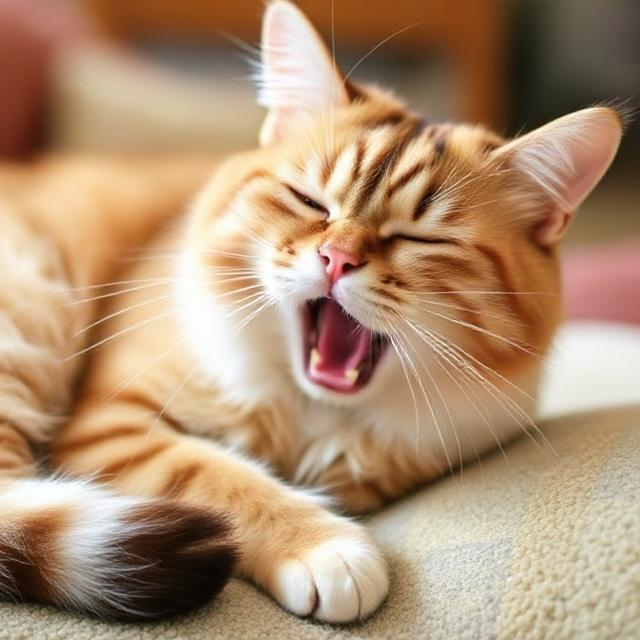Understanding Why Your Cat is Crying: Causes and Solutions
Concerned about why your cat is crying? Discover common causes of feline vocalization, from health issues to emotional needs, and learn how to help your distressed kitty.
Every cat parent has experienced that moment – you’re peacefully going about your day when suddenly, your feline friend starts crying out! Is it hunger? Pain? Boredom? Those persistent meows can be both concerning and confusing. Interestingly, adult cats rarely meow at each other – they’ve developed this vocalization specifically to communicate with humans! In this comprehensive guide, we’ll explore the various reasons behind your cat’s crying and how you can address them effectively. As someone who’s been through the midnight crying sessions with my own furry companions, I understand the worry and frustration you might be feeling. Let’s decode your cat’s language together!
Common Medical Reasons for Why Your Cat is Crying
Why your cat is crying more than usual, it can be concerning and confusing. While occasional meowing is normal, excessive vocalization often signals that something isn’t right. Let’s explore some of the most common medical issues that might cause your cat to become more vocal.
Pain or Discomfort
Cats are masters at hiding pain, but when it becomes severe, they may vocalize their distress.
“Many cat owners don’t realize that increased vocalization can be one of the first signs of pain,” explains Dr. Sarah Johnson, a veterinary specialist. “Cats might cry out when they move in certain ways or when specific areas are touched.”
Common painful conditions include:
- Arthritis, especially in older cats
- Dental disease or tooth infections
- Urinary tract infections or bladder stones
- Digestive discomfort or constipation
- Injuries or wounds that aren’t immediately visible
If your normally quiet cat suddenly becomes vocal, particularly when performing specific actions like jumping or using the litter box, pain could be the underlying cause.
Cognitive Dysfunction
As cats age, they can develop a condition similar to dementia in humans, called cognitive dysfunction syndrome.
“Elderly cats with cognitive issues often become confused or disoriented, especially at night,” says feline behaviorist Mark Wilson. “This disorientation can lead to increased vocalization as they try to communicate their confusion or anxiety.”
Signs that cognitive dysfunction might be behind your cat’s crying include:
- Increased vocalization primarily at night
- Seeming lost or confused in familiar environments
- Changes in sleep-wake cycles
- Decreased interaction with family members
- Inappropriate elimination outside the litter box
Hyperthyroidism
This common endocrine disorder in middle-aged and senior cats can cause numerous symptoms, including increased vocalization.
“Hyperthyroidism essentially kicks your cat’s metabolism into overdrive,” veterinarian Dr. Amelia Chen explains. “This can make cats feel constantly hungry, anxious, and restless, which often translates to more meowing and crying.”
In addition to increased vocalization, signs of hyperthyroidism may include:
- Weight loss despite increased appetite
- Increased thirst and urination
- Restlessness or hyperactivity
- Poor coat condition
- Elevated heart rate
Hypertension (High Blood Pressure)
High blood pressure in cats is often secondary to other conditions like kidney disease or hyperthyroidism, but it can directly cause behavioral changes including vocalization.
“Cats with hypertension may experience headaches or feel generally unwell, leading to vocalization,” notes Dr. Rodriguez from the Feline Medical Center. “More concerning is that hypertension can affect vision and even cause sudden blindness, which naturally would cause a cat to cry out in distress.”
Watch for these accompanying signs:
- Dilated pupils that don’t respond normally to light
- Disorientation or bumping into objects
- Sudden vision changes or blindness
- Blood in the eye chamber (visible redness)
Sensory Decline
As cats age, their senses may deteriorate, leading to behavior changes including increased vocalization.
“Hearing loss is particularly associated with louder meowing,” says veterinary technician Lisa Browning. “Cats may not realize how loudly they’re vocalizing when they can’t hear themselves properly.”
Similarly, vision loss can cause cats to become more vocal as they navigate their environment with less visual information. They may meow more frequently to:
- Locate their humans when they can’t see them clearly
- Express anxiety about their changing sensory experience
- Seek reassurance in situations that have become confusing
When to Seek Veterinary Care
Any sudden change in your cat’s vocalization patterns warrants attention, but certain situations call for immediate veterinary care.
If your cat’s crying is accompanied by:
- Difficulty urinating (especially in male cats, as this could indicate a life-threatening urinary obstruction)
- Signs of respiratory distress
- Visible pain or physical distress
- Refusal to eat or drink
- Disorientation or lack of coordination
Don’t wait to seek help. As Dr. Johnson emphasizes, “Cats are stoic by nature. When they’re vocal enough that you notice a significant change, that’s often their way of telling you something is seriously wrong.”
Conclusion
Understanding why your cat is crying is the first step toward providing them with the care and attention they need. Whether it’s addressing an underlying medical condition, meeting their basic needs more effectively, or providing additional environmental enrichment, your response should be tailored to the specific cause of their vocalization. Remember that your veterinarian is your best ally in determining if your cat’s crying indicates a serious health concern. With patience, observation, and the right interventions, you can help reduce your cat’s distress and strengthen your bond with them. After all, they’re trying to tell you something important—and now you’re better equipped to understand their feline language!
If you cat sleeping too much then check this post below
Why my cat sleeping to much

